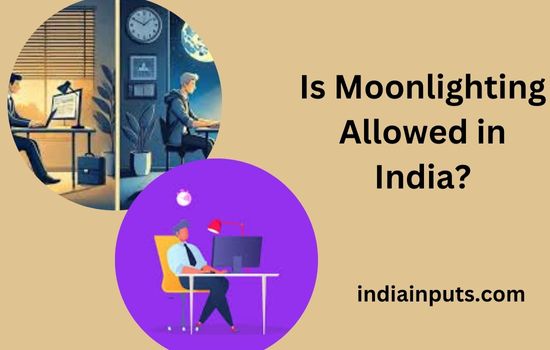Moonlighting in India is not explicitly prohibited by law, however the legality and feasibility of moonlighting depend on your employment contract and the specific nature of your secondary work.
In recent years, the concept of moonlighting—working a second job or freelance gig alongside a primary full-time job—has become a topic of heated debate in India. With the rise of the gig economy and remote work culture, more professionals, especially in the IT and creative industries, are seeking additional income streams. But this raises a pertinent question: Is moonlighting allowed in India?
Understanding Moonlighting

Moonlighting refers to the practice of taking up secondary employment or freelance assignments while already being employed full-time. This trend has gained traction due to increasing living costs, the desire to diversify skills, and the flexibility offered by modern work arrangements. However, moonlighting often sparks concerns around loyalty, productivity, and potential conflicts of interest.
Legal Perspective on Moonlighting in India
India’s labor laws do not explicitly define or regulate moonlighting, leaving its legality somewhat ambiguous. However, the acceptability of moonlighting largely depends on the terms of an employee’s contract and the policies of their employer.
1. Employment Contracts and Dual Employment: Most companies include exclusivity clauses in employment contracts, prohibiting employees from engaging in any other work, paid or unpaid, without prior permission. Violating such clauses could lead to disciplinary action, including termination.
2. Shops and Establishments Act: While India lacks a central law addressing moonlighting, some state-specific labor laws, like the Shops and Establishments Act, prohibit dual employment in factories and similar establishments. However, these laws typically don’t apply to modern sectors like IT or freelancing.
3. Confidentiality and Conflict of Interest: If an employee’s secondary work involves sharing sensitive information or competes directly with their primary employer, it can lead to legal repercussions under confidentiality agreements or intellectual property laws.
Ethical Concerns Around Moonlighting
Beyond legality, moonlighting raises ethical questions about an employee’s loyalty and commitment to their primary employer. Critics argue that juggling multiple jobs can lead to burnout, reduced productivity, and compromised quality of work. Employers also worry about divided attention and potential misuse of company resources.
On the other hand, proponents of moonlighting highlight its benefits, including financial security, skill enhancement, and creative satisfaction. In an era of rising inflation and economic uncertainty, many professionals see moonlighting as a way to safeguard their financial well-being.
Moonlighting in the IT Sector: A Case in Point
The Indian IT sector has been at the center of the moonlighting debate. In 2022, companies like Wipro and Infosys made headlines for taking strict action against employees caught moonlighting without disclosure. Infosys reiterated its stance by stating, “No two-timing—no moonlighting,” while Wipro terminated employees for breaching contract terms.
However, some companies, such as Swiggy, adopted a more progressive approach, allowing employees to take up side gigs with prior approval. This highlights the growing divide in employer attitudes toward moonlighting.
Balancing the Debate
For moonlighting to coexist with traditional employment structures, a balance is essential:
- Transparency: Employees should disclose secondary work to their primary employer, ensuring no conflict of interest.
- Clear Policies: Employers must clearly outline their stance on moonlighting, including conditions under which it is allowed.
- Skill-Based Gigs: Employees should prioritize gigs unrelated to their primary job to avoid conflicts.
Conclusion
Is moonlighting allowed in India? Legally, it depends on the employment contract and the sector. Ethically, it boils down to mutual trust and transparency between employers and employees. As work culture evolves, it is imperative for both parties to adapt to new norms, creating a flexible yet accountable workplace ecosystem. Moonlighting, when managed responsibly, can be a win-win for employees seeking growth and employers embracing modern work dynamics.

